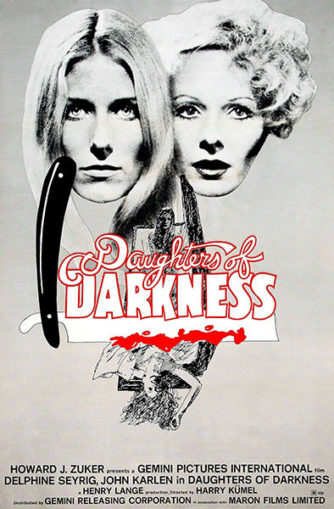 One of the great vampire films, a dreamy, seductive evocation of undead sensuality. It was made back in 1971 and has lost none of its power to startle and provoke.
One of the great vampire films, a dreamy, seductive evocation of undead sensuality. It was made back in 1971 and has lost none of its power to startle and provoke.
The stated inspiration for this film is Erzbet Bathory, the notorious Hungarian Countess who bathed in the blood of virgins to retain her youth, but its true antecedent is J. Sheridan LeFanu’s 1872 novella CARMILLA, an ahead-of-its-time shocker about the amorous doings of a lesbian vampire. Its influence can be seen in many early-seventies genre films, including VAMPYRES, LUST FOR A VAMPIRE, THE BLOOD-SPATTERED BRIDE and THE VELVET VAMPIRE. DAUGHTERS OF DARKNESS (LE ROUGE AUX LEVRES) is the best of the bunch by far.
Co-written and directed by Belgian filmmaker Harry Kumel, it was an extremely low budget work that featured the legendary French starlet Delphine Seyrig (LAST YEAR AT MARIENBAD) and American actor John Karlen (DARK SHADOWS). The result of their labors was the most successful Belgian movie of its time—and a classic for all time.
A young couple, Stefan and Valerie, are glimpsed aboard a speeding train having sex. They disembark at a luxurious seaside hotel that is completely empty of guests, apparently because it’s off-season.
Another couple arrives: the glamorous Countess Bathory and her gorgeous young companion Ilona. They strike up an acquaintanceship with Stefan and Valerie, much to the consternation of the hotel porter, who tells Stefan that the Countess last checked into the hotel 40 years earlier and that she looked exactly the same then as she does now—which makes sense, as the countess is a vampire.
But the Countess has her eye on Valerie and won’t be denied. She takes to seducing her while Ilona goes to work on Stefan; but he accidentally kills Ilona during the tryst, leading to a nightmarish body dumping in which the Countess cements her hold on the now-vampirized Valerie. The following night Stefan decides he’s ready to leave, but the Countess has other ideas. She and Valerie succeed in subduing and then killing Stefan, leading to another nighttime corpse disposal—but getting home before dawn won’t be easy, and will have deadly consequences for these undead babes, who, being vampires, can’t stand the light of day.
The hypnotic power this film exerts is palpable and unprecedented. I defy you to find another vampire movie which so brilliantly conveys both the horror and allure of vampirism. The painfully low budget isn’t exactly hard to spot—in the extremely sparse locations (all four of them) and grainy photography—but Harry Kumel is a resourceful filmmaker who makes his limitations work for rather than against him by concentrating on his central characters and their interrelationships.
From a plot standpoint it may not make much sense that the hotel where most of the action takes place is deserted except for the principals, but it allows Kumel a focus he couldn’t otherwise have achieved. His low budget ingenuity is evident elsewhere in the film, or so it might seem: note the way the color of a shot near the end flares three times, each accompanied by a sound effect. The flares fit right in with the film’s surrealistic atmosphere, yet Kumel has claimed they were in actuality simple lab mistakes.
The narrative is languid and meandering, yet the film is as arresting as an action thriller. This is a testament not only to Harry Kumel’s total command of the medium, but also the four lead performances. The standout is Delphine Seyrig, who creates possibly the most glamorous and seductive screen vampiress ever, garbed in appropriately glitzy outfits. Soft-core sex goddess Andrea Rau is nearly as alluring as Seyrig’s pasty, dark-haired partner in crime, perhaps the cinema’s first true Goth babe.
Vital Statistics
DAUGHTERS OF DARKNESS (LE ROUGE AUX LEVRES)
Showking/Blue Underground
Director: Harry Kumel
Producers: Henry Lange, Paul Collet
Screenplay: Pierre Drouot, Jean Ferry, Harry Kumel
Cinematography: Eduard Van Der Enden
Editing: Gust Vershueren, Denis Bonan, Fima Noveck
Cast: Delphine Seyrig, John Karlen, Danielle Ouimet, Andrea Rau, Paul Esser
